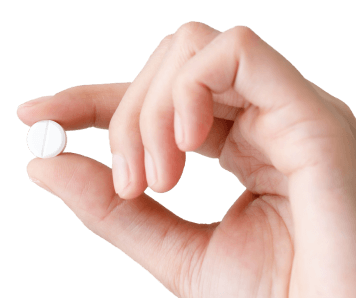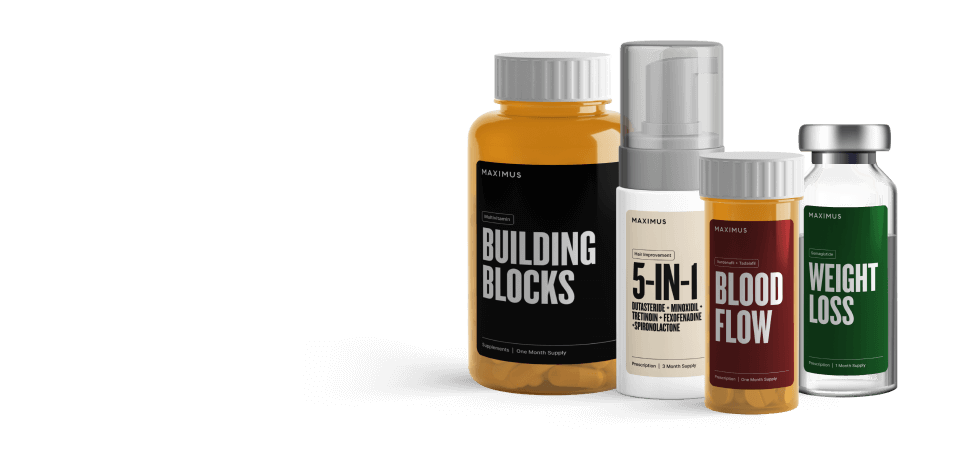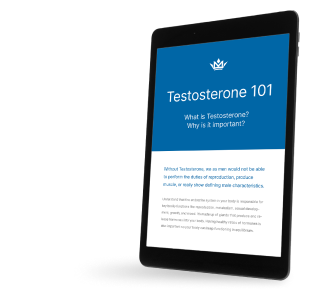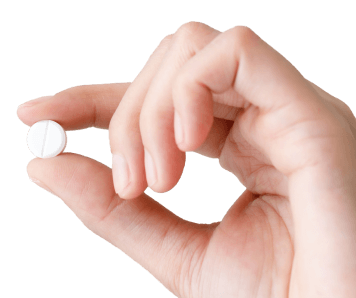Testosterone Restoration.
Testosterone Replacement Therapy (TRT) shuts down your body’s own production of testosterone and replaces it with synthetic testosterone that is typically injected, which results in testicular shrinkage, infertility, and dependence. However, a newer, cutting-edge approach is testosterone restoration, using oral medications to restore your body’s own natural production of testosterone without these adverse effects.1

Selective Estrogen Receptor Modulators (SERMs) act as estrogen antagonists—they block estrogen from binding to the estrogen receptor in the brain, at the hypothalamus and the pituitary gland.
So when the brain thinks that it’s not getting enough estrogen, it stimulates the production of the hormones luteinizing hormone (LH) and Follicle Stimulating Hormone (FSH), which increases the testes production of testosterone and sperm, respectively. This cleverly stimulates your body into producing more of its own natural testosterone!
Enclomiphene is the purified isomer of Clomid (Clomiphene Citrate), which has been FDA approved since 1967 for fertility in women, and has been commonly used off-label in men. Many research studies suggest Clomid “is safe and effective with few side effects when used as long-term treatment of hypogonadism (low testosterone)”2 and is an “effective and safe alternative to testosterone supplementation in [young] men wishing to preserve their fertility”.3
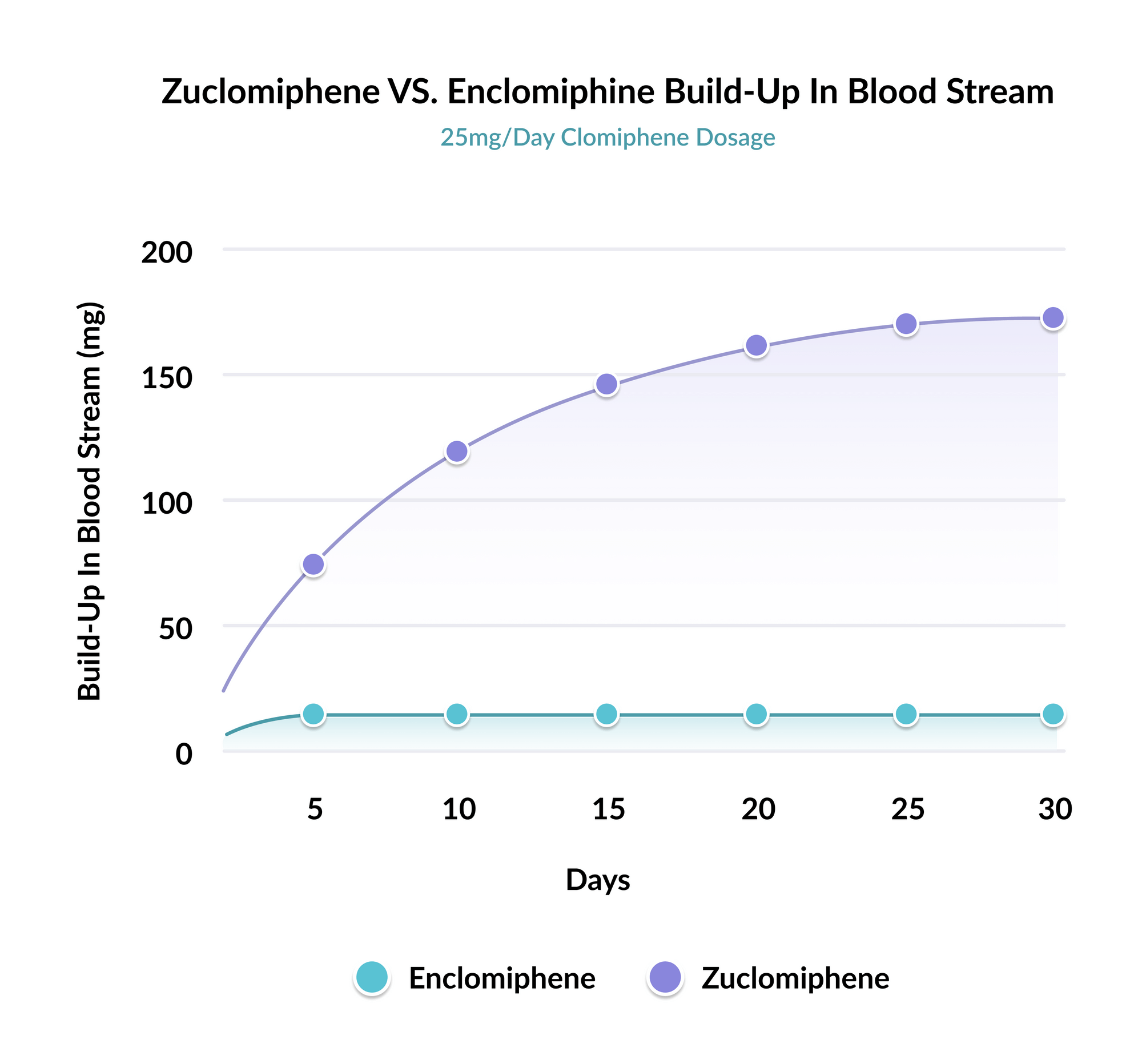
However, Clomid is actually made up of a mixture of two isomers: 38% zuclomiphene and 62% enclomiphene. Zuclomiphene is an estrogen receptor agonist (increases estrogen) that stays in your system a long time and accumulates much more over time than enclomiphene.4
Clomid is believed to cause some minor side effects such as mood swings, depressed mood, irritability, anxiety, gynecomastia, and libido issues that can develop in a small percentage of patients over time.5
"The literature has suggested that most of the beneficial effects of clomiphene are due to the trans-isomer enclomiphene. Zuclomiphene contributes little to the intended outcomes.“6 Maximus’ cutting-edge innovation leverages purified Clomid to maximize the amount of enclomiphene present. Thus, using this new, purer form “maintains the androgenic benefit of clomiphene citrate without the undesirable effects attributable to zuclomiphene”, and has been shown to yield increased testosterone levels and maintain sperm concentration (unlike TRT).6
Experts believe enclomiphene should “become the primary medication for men with secondary hypogonadism (low T) who wish to preserve spermatogenesis (fertility)” and is “a very promising drug for patients with secondary hypogonadism and who are concerned about the negative effects of exogenous testosterone.”6
Studies using enclomiphene for testosterone restoration vs. testosterone gel for testosterone replacement therapy show why this approach is superior in individuals who still have normal testicular function. In obese, hypogonadal (low T) men, enclomiphone increases testosterone more than testosterone gel and keeps levels more consistently stable:


In addition, enclomiphene stimulates the testes (and actually increases their size) to produce Luteinizing Hormone (LH) & Follicle Stimulating Hormone (FSH), which is how the body naturally and endogenously produces testosterone and sperm.
In contrast, testosterone gel has the opposite effect: significantly impairing LH & FSH production, thus inhibiting endogenous production of testosterone & sperm, which causes testicular shrinkage and external dependence on testosterone gel.7
The adverse effects of enclomiphene have been extensively studied during phase II and phase III clinical trials. The drug is generally well tolerated with side-effects occurring relatively rarely.6
“Overall, there was no evidence of drug toxicity and rates of adverse events were not significantly different from placebo.”6
While we maintain our position that supplements do not meaningfully increase testosterone on their own, they can address underlying hormonal deficiencies that may be limiting the efficacy of our protocol. In particular, most men are deficient in fat-soluble vitamins, which actually function as hormones in the body.
For example, our first validation study showed that 66% of our clients living in Los Angeles were Vitamin D deficient (8
 Maximus’ Custom Formulated Supplement: Building Blocks*
Maximus’ Custom Formulated Supplement: Building Blocks*
The Maximus Building Blocks supplement is an essential multivitamin that optimizes energy production and prevents nutritional deficiencies that impair hormone production. It includes the best high-potency, bioavailable forms of 15 key vitamins and minerals in clinical-level dosages, which are not commonly found in standard multivitamins. It’s been formulated to work synergistically with Testosterone Protocol to enable your body to produce and maintain optimal levels of testosterone.
The Building Blocks supplement is superior to alternatives on the market, some of which charge $60+ for a 30 day supply.
Already taking supplements? We recommend that you discontinue any supplement or multivitamin that you may be taking that overlaps with ingredients in Building Blocks to prevent excessive dosages (which will save you money, as Building Blocks is best-in-class).
Each ingredient in Building Blocks has been carefully researched and sourced. Read on to learn more about the power packed in each ingredient.
Vitamin A functions in a hormone-like manner to regulate the expression of a number of genes and body functions, including testicular function and sperm production, and Vitamin A deficiency adversely affects testosterone secretion.9,10 In Dr. Chris Masterjohn’s article, “Vitamin A: The Forgotten Bodybuilding Nutrient”, he notes that Vitamin A “is essential to muscle-building and may be the bodybuilder’s most potent weapon… [given] diets very high in protein… deplete vitamin A reserves.”11 Vitamin A is necessary for the utilization of protein and the production of testosterone and other growth factors, and so we include it here at a higher dosage to balance the higher doses of the other fat-soluble vitamins/hormones.
Vitamin D plays a critical role in formation of hormones, bone, muscle function, immune function, glucose tolerance, and cardiometabolic function.12 Studies show that men with sufficient Vitamin D levels had significantly higher levels of testosterone and significantly lower levels of SHBG when compared to Vitamin D insufficient & deficient men.13 One randomized controlled trial also showed that daily supplementation of 3,332 IU vitamin D increased free & total testosterone levels by 20% & 25%, though this finding has not been consistently replicated.14 We find that almost all multivitamins significantly underdose Vitamin D (1-2,000 IU) and that a higher dose of 10,000 IU (the upper tolerable limit) is necessary to get most men from deficient to optimal ranges and ensure testosterone production.
Vitamin K is also critical to take alongside Vitamin D to make sure calcium is going to the right places (i.e. your bones instead of soft tissues like your arteries). Vitamin K2 has been demonstrated to improve heart health, increasing cardiac output as well.15
The MK-7 version of Vitamin K2 has been shown to have greater bioavailability than MK-4 when taken as a supplement.16 This is the form Maximus includes in Building Blocks.
A recent study showed that no matter what form of Vitamin K you consume, the body converts it all into MK-4 in your tissues.17 MK-4 is “should be considered and consequently classified as a hormone” that activates a plethora of genes.18 Studies show that MK-4 stimulates testosterone production in rats through via activating CAMP & PKA, doubling testosterone levels compared to control, though this has not yet been replicated in humans.19
Vitamin E actually has eight different chemical forms (alpha-, beta-, gamma-, and delta-tocopherol and alpha-, beta-, gamma-, and delta-tocotrienol) and is often misunderstood since 90%+ of research has been done on the tocopherol forms most commonly found in supplements. Dr. Barrie Tan discovered the tocotrienol forms, which are much more potent free radical scavenger and antioxidants.20 For over 100 years, Vitamin E has been known to be critical for fertility, as it is involved in the HPG Axis’ production of LH (which stimulates production) & FSH (which stimulates sperm) and nearly doubled the testosterone increase (from ~500 ng/dl to 1000+ ng/dl) in response to HCG stimulation (which functions similarly to enclomiphene).21 Studies also show tocotrienols specifically have synergistic effects with SERMs (Selective Estrogen Receptor Modulators) in regulating estrogen.22 Thus, 50 mg of this extra potent tocotrienol form of Vitamin E is included without any of the tocopherol form that may interfere with its function.
Geranylgeraniol (GG) was discovered by Dr. Barrie Tan, the world’s leading expert on Vitamin E tocotrienols (who we hosted on the Maximus Podcast). GG is the side-chain of MK-4 that is likely responsible for its effects, and may also have unique benefits in promoting muscle protein synthesis (and is inhibited by prescription statin drugs, which is the likely explanation for why they cause muscle pain). In vitro and rat studies show that GG enhances testosterone and progesterone (its precursor) via cAMP/PKA signaling. Researchers concluded that GG has “potential benefits… as a therapeutic agent for low testosterone levels, such as late-onset hypogonadism in men.”23 Building Blocks uses a clinical strength dose of GG to ensure your requirements are met.
• Vitamin B1 (as Thiamin Mononitrate): 5 mg
• Vitamin B2 (as Riboflavin): 5 mg
• Niacin (as Nicotinic Acid): 50 mg
• Vitamin B6 (as Pyridoxal-5’-Phosphate, or P5P): 5 mg
• Folate (as L-5-Methyltetrahydrofolate): 680 mcg DFE
• Vitamin B12 (as Methylcobalamin): 100 mcg
Collectively, the B vitamins play important roles in a variety of critical biological processes. Much of the attention given to B vitamins is for their role in mitochondrial function and energy metabolism.24 But they are responsible for much more than energy production, including: DNA synthesis and repair, immunity, and steroid activity.25
As noted above, Maximus uses the best high-potency, bioavailable forms of vitamins. For instance, the Pyridoxal-5’-Phosphate (P5P) used for Vitamin B6 supplementation skips hepatic conversion processes, making it the optimized form (vs Pyridoxine Hydrochloride) for supplementation.
Magnesium plays a pivotal role in Adenosine triphosphate (ATP) synthesis, which most individuals recognize as an energy source for cellular reactions.26 ATP is important for steroid production.27 Ensuring your body has the resources necessary to generate energy is therefore foundational to hormone optimization.
It should not be too surprising then that studies find magnesium intake is positively correlated with testosterone.28 Supporting this observation, a study of both sedentary and athlete subjects showed magnesium supplementation supports increases in free and total testosterone values.29
Interesting research from group Guillaume et al. shows that magnesium may actually mediate variation in T-SHBG affinity, increasing the amount of biologically active testosterone.30
The form of magnesium used in Building Blocks, magnesium N-acetyltaurinate, has been shown to absorb rapidly and achieve higher tissue concentration in the brain than other forms of magnesium. This advanced availability has been found to be associated with a decrease in anxiety orders.31 Other studies have demonstrated greater resilience of the brain to damage while supplemented with magnesium N-acetyletaurinate.32
Zinc supplementation in marginally zinc-deficient men has shown to bolster testosterone levels.33 The effect of zinc administration has been shown to be more impactful in men with below average testosterone levels.34 It is important to reiterate however that while medicinal doses of zinc may increase testosterone levels and sperm count, in many cases it will be insufficient in treating hypogonadism on its own.35 Furthermore, for men looking to optimize their otherwise ‘normal’ testosterone levels, zinc supplementation alone is not likely to achieve their goals. Consider zinc a necessary ‘building block’ for testosterone production but do not rely solely on it.
Beyond testosterone and reproductive health, zinc is vital to gastrointestinal, neural, immunal, and most physiological systems in the body.36
Copper, like zinc, is critical for reproductive health, as it acts as an essential cofactor for multiple processes.
Studies in men (as well as animals) have shown that copper is beneficial to semen and sperm. Sertoli cells are less active with a copper deficiency, which is reverted when copper is supplemented.37
Copper is involved in mitochondrial function and metabolism. Mitochondria (organelles involved in energy production) in the cells gather copper for copper-dependent enzymes required for efficient energy production (oxidative metabolism).38
An ever-increasing body of literature on saffron and its constituents endorse its benefits to humans. Anti-inflammatory, anti-oxidant, DNA-protecting, and anti-atheroslcerotic properties are among the benefits observed in studies. It has been suggested that the use of saffron may be effective in supporting disorders ranging from coronary artery diseases, hypertension, and even learning and memory impairments.39 40
A pilot study in men with erectile dysfunction found improvements in sexual function (measured as number and duration of erectile events) when treated with saffron daily.41
Saffron in the form of extracts, as found in the Building Blocks supplement, possess greater potency.
Want access to Maximus Building Blocks?
Our pharmaceutical-grade Building Blocks supplement comes custom formulated, and is only available directly through our pharmacy partners as part of our Maximus protocols.
We strongly recommend you take it with a fatty meal (or any fat such as MCT oil in your bulletproof coffee) for proper absorption, ideally in the morning alongside your prescription medication. The recommended 3 capsules/day will provide 30 daily servings, which aligns exactly with the dosage count of the prescription medications provided as part of our protocols.
Ready to sign up for Maximus protocol? Start by choosing a protocol, then complete the medical questionnaire you are prompted with to see if you qualify.
Already a subscriber to a Maximus protocol? You have the opportunity to include the Building Blocks supplement during any of your refill questionnaires.
You have questions, we have answers.
Review Our Help DeskHow do I know Testosterone Protocol works?
Extensive scientific research and clinical practice have vetted the oral medications used in Testosterone Protocol. You can learn more about the research behind Testosterone Protocol here.
Testosterone Protocol includes CLIA-certified at-home lab testing to evaluate your “before and after” results. These lab kits allow you to see the results for yourself, and are used by your clinician to optimize the pharmaceutical dosage to your unique needs.
Maximus stands behind Testosterone Protocol with a Money Back Guarantee which you can learn more about here.
How does the at-home lab kit work?
As soon as you complete your onboarding questionnaire we will ship you your at-home lab kit via priority mail (if qualified).
The kit requires no finger-pricking. Instructions are fast and intuitive.
Completed kits are conveniently picked up from your home by one of our carriers -- at no additional cost to you. Or you can drop it off at one of our carriers if you would prefer.
Within days of the completed kit reaching the lab, your results will be shared with you and your Maximus doctor.
Depending on your location and how fast you complete the kit once you receive it, the entire process can take as few as 4-5 days.
Is Testosterone Protocol as effective as TRT?
The Maximus Testosterone Protocol is a safer alternative to TRT. It is based on extensive scientific research and clinical practice that has validated our approach. In fact, a recent review by top experts concluded that our therapy should “become the primary medication for men with secondary hypogonadism (low T) who wish to preserve spermatogenesis (fertility)… and is “a very promising drug for patients with secondary hypogonadism and who are concerned about the negative effects of exogenous testosterone (TRT).”
Read more about how The King Protocol compares to TRT.
What is the cost and what’s included?
The treatment cost for the King Protocol is $199.99/month, which includes doctor consultation and medication (if qualified).
Labs are required in months 1 and 2, and cost $72.50 each. The first kit is shipped upon completion of your onboarding intake to capture your baseline hormone levels. The second kit is shipped upon completion of your followup intake (~30 days later) to capture your hormone changes on The King Protocol. If additional labs are required, costs are passed through directly to you at no profit to Maximus.
Does Testosterone Protocol have any adverse side effects (like hair loss)?
General adverse effects
The adverse effects of enclomiphene have been extensively studied during phase II and phase III clinical trials. The drug is generally well tolerated, however infrequent side effects may occur such as:
— Headache (observed in 3.3% of patients)
— Nausea (observed in 2.1% of patients)
— Diarrhea (observed in 1.9% of patients)
— Common Cold (observed in 1.7% of patients)
— Hot flush (observed in 1.7% of patients)
— Joint pain (observed in 1.2% of patients)
— Dizziness (observed in 1% of patients)
Overall, there was no evidence of drug toxicity and rates of adverse events were not significantly different from placebo. 1
Hair loss
Some people ask how our protocol could affect hair loss, because they've heard Testosterone Replacement Therapy (TRT) worsens hair loss, since testosterone converts to DHT, another androgenic hormone that may contribute to male pattern baldness.
Our protocol is very different than TRT by stimulating your own natural production of testosterone, which affects DHT differently than synthetic testosterone taken from outside of the body. A study showed that testosterone replacement gel (1% 10g) increased DHT by 8X as much as enclomiphene, even at higher dosages than what we typically use (12.5-50 mg).
TRT also shifts the balance between the two hormones (DHT:TT ratio) towards DHT, while enclomiphene maintains the balance. Thus, enclomiphene should have minimal effect on hair loss compared to Testosterone Replacement Therapy (TRT), and is much more "hair safe/friendly" for most people. 2
If you are experiencing these or other side effects, please immediately contact your licensed clinician through the patient portal.
1. Earl JA, Kim ED. Enclomiphene citrate: A treatment that maintains fertility in men with secondary hypogonadism. Expert Rev Endocrinol Metab. 2019;14(3):157-65.
2. Ronald D. Wiehle, PhD, Gregory K. Fontenot, PhD, Michael S. Willett, PharmD, Wilfredo D. Garcia, MD, and Joseph S. Podolski, BS, MS. Enclomiphene Citrate Stimulates Serum Testosterone in Men With Low Testosterone Within 14 Days Journal of Men's Health.Dec 2014.196-205.
What states is Testosterone Protocol available in?
Maximus currently serves all US States, except Alabama, Alaska, Indiana, and the District of Columbia. Maximus does not serve US Territories and Freely Associated States at this time.
We are expanding as quickly as possible. In the meantime, sign up for our newsletter to get updates and gain access to our free E-Book and Discord community. You can sign up by visiting Testosterone 101 or scrolling to the bottom of this page and providing your email.
Can I use my HSA or FSA card to pay for Testosterone Protocol?
Maximus accepts Health Savings Accounts (HSA) and Flexible Spending Accounts (FSA).
Using your HSA/FSA is easy. Simply use your HSA/FSA card as you would any other debit or credit card when providing your billing information.
HSA/FSA plans vary on what services they are willing to cover. If you are uncertain whether your plan covers Maximus' services, check with your plan administrator.
Does Maximus guarantee results on Testosterone Protocol?
Yes. If you do not see increased testosterone, as validated with at-home lab testing, you may be eligible for your money back.
For more details: Maximus Money Back Guarantee
Is Testosterone Protocol vegan-friendly and kosher?
Yes to both, though you should specify your special needs during your onboarding so that your doctor prescribes the appropriate capsules.
- McCullough A. Alternatives to testosterone replacement: testosterone restoration. Asian J Androl. 2015;17(2):201-5.
- Krzastek SC, Sharma D, Abdullah N, et al. Long-Term Safety and Efficacy of Clomiphene Citrate for the Treatment of Hypogonadism. J Urol. 2019;202(5):1029-35.
- Katz DJ, Nabulsi O, Tal R, Mulhall JP. Outcomes of clomiphene citrate treatment in young hypogonadal men. BJU Int. 2012;110(4):573-8.
- Huang ES, Miller WL. Estrogenic and antiestrogenic effects of enclomiphene and zuclomiphene on gonadotropin secretion by ovine pituitary cells in culture. Endocrinology. 1983;112(2):442-8.
- Choi SH, Shapiro H, Robinson GE, et al. Psychological side-effects of clomiphene citrate and human menopausal gonadotrophin. J Psychosom Obstet Gynaecol. 2005;26(2):93-100.
- Earl JA, Kim ED. Enclomiphene citrate: A treatment that maintains fertility in men with secondary hypogonadism. Expert Rev Endocrinol Metab. 2019;14(3):157-65.
- Kim ED, McCullough A, Kaminetsky J. Oral enclomiphene citrate raises testosterone and preserves sperm counts in obese hypogonadal men, unlike topical testosterone: restoration instead of replacement. BJU Int. 2016;117(4):677-85.
- Zaidi SJ. Hormone D deficiency--a serious endocrine disorder. Endocr Pract. 2010;16(4):712.
- Ross AC, Ternus ME. Vitamin A as a hormone: recent advances in understanding the actions of retinol, retinoic acid, and beta carotene. J Am Diet Assoc. 1993;93(11):1285-90; quiz 1291-2.
- Masterjohn, C. Vitamin A: The Forgotten Bodybuilding Nutrient. Published December 14, 2014. Accessed December 15, 2021.
- Yang Y, Luo J, Yu D, et al. Vitamin A Promotes Leydig Cell Differentiation via Alcohol Dehydrogenase 1. Front Endocrinol (Lausanne). 2018;9:644.
- Binkley N. Is vitamin D the fountain of youth. Endocr Pract. 2009;15(6):590-6.
- Wehr E, Pilz S, Boehm BO, März W, Obermayer-Pietsch B. Association of vitamin D status with serum androgen levels in men. Clin Endocrinol (Oxf). 2010;73(2):243-8.
- Pilz S, Frisch S, Koertke H, et al. Effect of vitamin D supplementation on testosterone levels in men. Horm Metab Res. 2011;43(3):223-5.
- McFarlin BK, Henning AL, Venable AS. Oral Consumption of Vitamin K2 for 8 Weeks Associated With Increased Maximal Cardiac Output During Exercise. Altern Ther Health Med. 2017 Jul;23(4):26-32. PMID: 28646812.
- Schurgers LJ, Teunissen KJ, Hamulyák K, Knapen MH, Vik H, Vermeer C. Vitamin K-containing dietary supplements: comparison of synthetic vitamin K1 and natto-derived menaquinone-7. Blood. 2007 Apr 15;109(8):3279-83. doi: 10.1182/blood-2006-08-040709. Epub 2006 Dec 7. PMID: 17158229.
- Sato T, Inaba N, Yamashita T. MK-7 and Its Effects on Bone Quality and Strength. Nutrients. 2020;12(4):E965.
- Oxholm Gordeladze J. Vitamin K2: A vitamin that works like a hormone, impinging on gene expression. In: Cell Signalling - Thermodynamics and Molecular Control. IntechOpen; 2019.
- Ito A, Shirakawa H, Takumi N, et al. Menaquinone-4 enhances testosterone production in rats and testis-derived tumor cells. Lipids Health Dis. 2011;10:158.
- Benson D. Barrie Tan, PhD: Using Tocotrienols to Address Lifestyle and Metabolic Disease. Integr Med (Encinitas). 2019;18(2):26-7.
- Umeda F, Kato K, Muta K, Ibayashi H. Effect of vitamin E on function of pituitary-gonadal axis in male rats and human subjects. Endocrinol Jpn. 1982;29(3):287-92.
- Nesaretnam K, Selvaduray KR, Abdul Razak G, Veerasenan SD, Gomez PA. Effectiveness of tocotrienol-rich fraction combined with tamoxifen in the management of women with early breast cancer: a pilot clinical trial. Breast Cancer Res. 2010;12(5):R81.
- Ho HJ, Shirakawa H, Giriwono PE, Ito A, Komai M. A novel function of geranylgeraniol in regulating testosterone production. Biosci Biotechnol Biochem. 2018;82(6):956-62.
- Mikkelsen K, Apostolopoulos V. B Vitamins and Ageing. Subcell Biochem. 2018;90:451-470. doi: 10.1007/978-981-13-2835-0_15. PMID: 30779018.
- Ko YH, Hong S, Pedersen PL. Chemical mechanism of ATP synthase. Magnesium plays a pivotal role in formation of the transition state where ATP is synthesized from ADP and inorganic phosphate. J Biol Chem. 1999 Oct 8;274(41):28853-6. doi: 10.1074/jbc.274.41.28853. PMID: 10506126.
- Khanum A, Buczko E, Dufau ML. Essential role of adenosine triphosphate in activation of 17beta-hydroxysteroid dehydrogenase in the rat Leydig cell. Endocrinology. 1997 Apr;138(4):1612-20. doi: 10.1210/endo.138.4.5062. PMID: 9075722.
- Maggio M, Ceda GP, Lauretani F, Cattabiani C, Avantaggiato E, Morganti S, Ablondi F, Bandinelli S, Dominguez LJ, Barbagallo M, Paolisso G, Semba RD, Ferrucci L. Magnesium and anabolic hormones in older men. Int J Androl. 2011 Dec;34(6 Pt 2):e594-600. doi: 10.1111/j.1365-2605.2011.01193.x. Epub 2011 Jun 15. PMID: 21675994; PMCID: PMC4623306. https://pubmed.ncbi.nlm.nih.gov/21675994/
- Cinar V, Polat Y, Baltaci AK, Mogulkoc R. Effects of magnesium supplementation on testosterone levels of athletes and sedentary subjects at rest and after exhaustion. Biol Trace Elem Res. 2011 Apr;140(1):18-23. doi: 10.1007/s12011-010-8676-3. Epub 2010 Mar 30. PMID: 20352370.
- Maggio M, De Vita F, Lauretani F, Nouvenne A, Meschi T, Ticinesi A, Dominguez LJ, Barbagallo M, Dall'aglio E, Ceda GP. The Interplay between Magnesium and Testosterone in Modulating Physical Function in Men. Int J Endocrinol. 2014;2014:525249. doi: 10.1155/2014/525249. Epub 2014 Mar 3. PMID: 24723948; PMCID: PMC3958794.
- Uysal N, Kizildag S, Yuce Z, Guvendi G, Kandis S, Koc B, Karakilic A, Camsari UM, Ates M. Timeline (Bioavailability) of Magnesium Compounds in Hours: Which Magnesium Compound Works Best? Biol Trace Elem Res. 2019 Jan;187(1):128-136. doi: 10.1007/s12011-018-1351-9. Epub 2018 Apr 21. PMID: 29679349.
- Depeint F, Bruce WR, Shangari N, Mehta R, O'Brien PJ. Mitochondrial function and toxicity: role of the B vitamin family on mitochondrial energy metabolism. Chem Biol Interact. 2006 Oct 27;163(1-2):94-112. doi: 10.1016/j.cbi.2006.04.014. Epub 2006 May 1. PMID: 16765926.
- Hosgorler F, Koc B, Kizildag S, Canpolat S, Argon A, Karakilic A, Kandis S, Guvendi G, Ates M, Arda NM, Uysal N. Magnesium Acetyl Taurate Prevents Tissue Damage and Deterioration of Prosocial Behavior Related with Vasopressin Levels in Traumatic Brain Injured Rats. Turk Neurosurg. 2020;30(5):723-733. doi: 10.5137/1019-5149.JTN.29272-20.1. PMID: 32865219.
- Prasad AS, Mantzoros CS, Beck FW, Hess JW, Brewer GJ. Zinc status and serum testosterone levels of healthy adults. Nutrition. 1996 May;12(5):344-8. doi: 10.1016/s0899-9007(96)80058-x. PMID: 8875519.
- Netter A, Hartoma R, Nahoul K. Effect of zinc administration on plasma testosterone, dihydrotestosterone, and sperm count. Arch Androl. 1981 Aug;7(1):69-73. doi: 10.3109/01485018109009378. PMID: 7271365.
- Santos HO, Teixeira FJ. Use of medicinal doses of zinc as a safe and efficient coadjutant in the treatment of male hypogonadism. Aging Male. 2020 Dec;23(5):669-678. doi: 10.1080/13685538.2019.1573220. Epub 2019 Feb 15. PMID: 30767598. https://pubmed.ncbi.nlm.nih.gov/30767598/
- Vallee BL, Falchuk KH. The biochemical basis of zinc physiology. Physiol Rev. 1993 Jan;73(1):79-118. doi: 10.1152/physrev.1993.73.1.79. PMID: 8419966.
- Calderón B, Gómez-Martín JM, Cuadrado-Ayuso M, Cobeta P, Vega-Piñero B, Mateo R, Galindo J, Botella-Carretero JI. Circulating Zinc and Copper Levels are Associated with Sperm Quality in Obese Men after Metabolic Surgery: A Pilot Study. Nutrients. 2020 Oct 30;12(11):3354. doi: 10.3390/nu12113354. PMID: 33143218; PMCID: PMC7692370.
- Ruiz LM, Libedinsky A, Elorza AA. Role of Copper on Mitochondrial Function and Metabolism. Front Mol Biosci. 2021 Aug 24;8:711227. doi: 10.3389/fmolb.2021.711227. PMID: 34504870; PMCID: PMC8421569.
- Khazdair MR, Boskabady MH, Hosseini M, Rezaee R, M Tsatsakis A. The effects of Crocus sativus (saffron) and its constituents on nervous system: A review. Avicenna J Phytomed. 2015 Sep-Oct;5(5):376-91. PMID: 26468457; PMCID: PMC4599112.
- Su X, Yuan C, Wang L, Chen R, Li X, Zhang Y, Liu C, Liu X, Liang W, Xing Y. The Beneficial Effects of Saffron Extract on Potential Oxidative Stress in Cardiovascular Diseases. Oxid Med Cell Longev. 2021 Jan 19;2021:6699821. doi: 10.1155/2021/6699821. PMID: 33542784; PMCID: PMC7840270.
- Shamsa A, Hosseinzadeh H, Molaei M, Shakeri MT, Rajabi O. Evaluation of Crocus sativus L. (saffron) on male erectile dysfunction: a pilot study. Phytomedicine. 2009 Aug;16(8):690-3. doi: 10.1016/j.phymed.2009.03.008. Epub 2009 May 9. PMID: 19427775.
Maximus makes no promise or guarantee of what medications or supplements are prescribed, as these are always determined by the judgement of your clinician to decide what is appropriate care for you.
